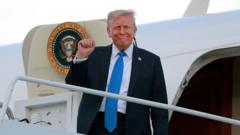Amid pressing crises, Friedrich Merz becomes Germany's chancellor, leading through a time of uncertainty as he confronts economic stagnation and a resurgent far-right party.
Friedrich Merz: Germany's New Chancellor Faces Unprecedented Challenges

Friedrich Merz: Germany's New Chancellor Faces Unprecedented Challenges
Friedrich Merz steps into a tumultuous political landscape as Germany's new leader amidst economic struggles and rising nationalism.
Friedrich Merz, now taking the helm as Germany's 10th chancellor, is stepping onto a complicated political stage. At 69, with no prior executive experience in government, Merz faces unprecedented challenges that threaten the country's stability. Once a corporate lawyer, he recalls a daring parachute jump made during a Foreign Legion event two decades ago – a leap that now seems fitting as he navigates turbulent times.
His ascension to leadership occurs 35 years after the reunification of East and West Germany, and he does so amidst a stagnant economy and escalating tensions within the social fabric of the nation. The rise of the anti-immigrant party, Alternative for Germany (AfD), has added pressure, surpassing traditional parties in popularity polls, which has raised alarms as they have recently been classified as extremist by German intelligence.
Merz’s coalition government, led by his center-right Christian Democrats, has the challenging task of addressing immediate crises while rebuilding trust with international allies, particularly the United States. The political landscape is fraught, and his administration will need to act swiftly to stabilize the situation and counteract the rising tide of nationalism that threatens to reshape Germany's identity.



















